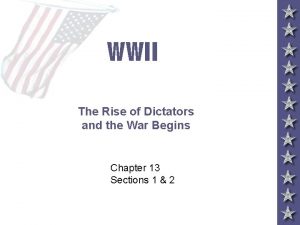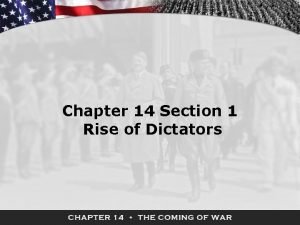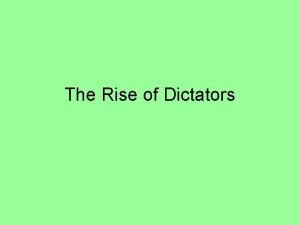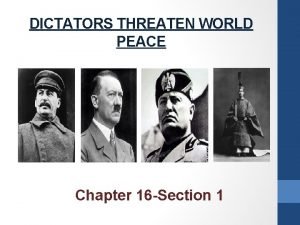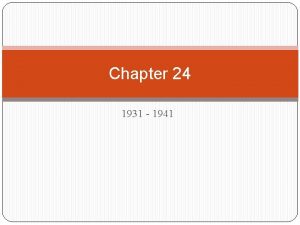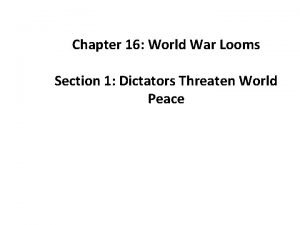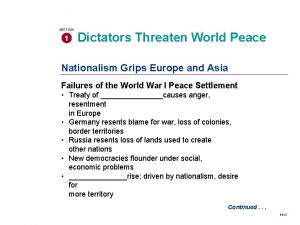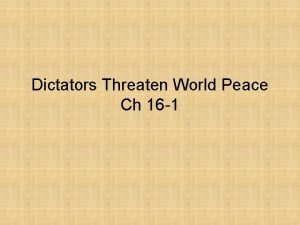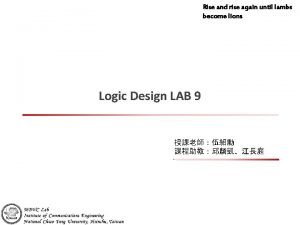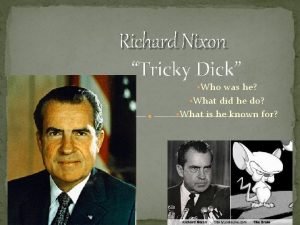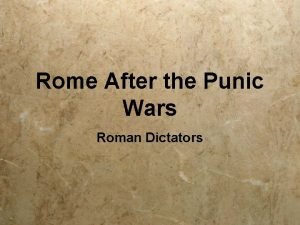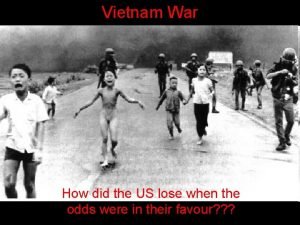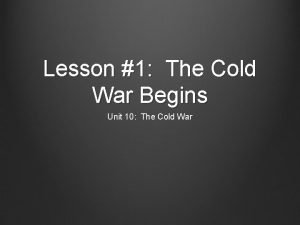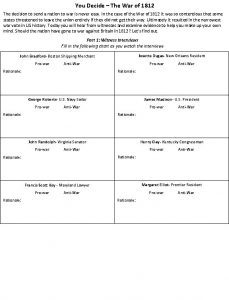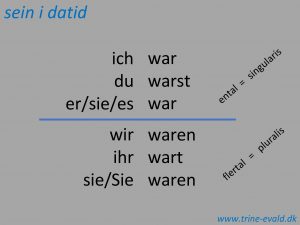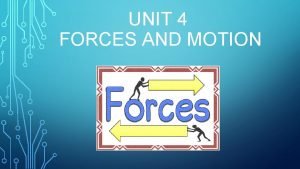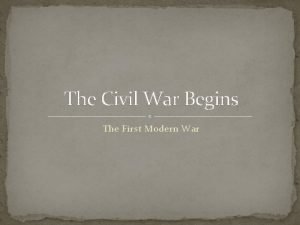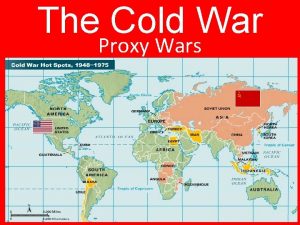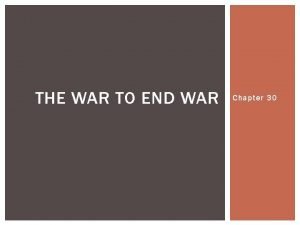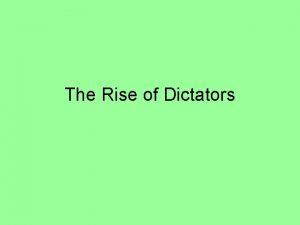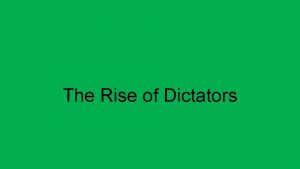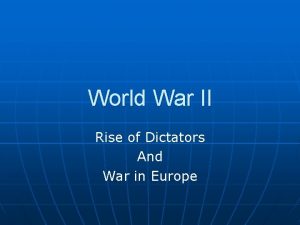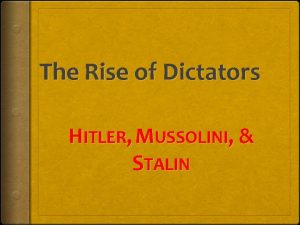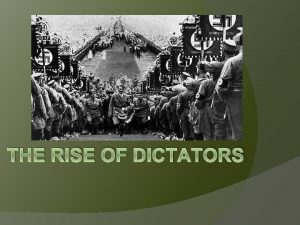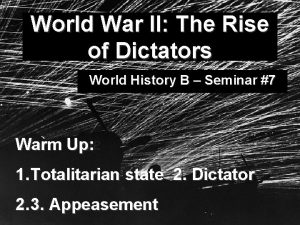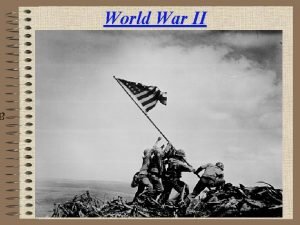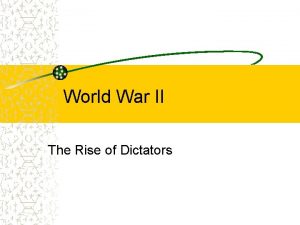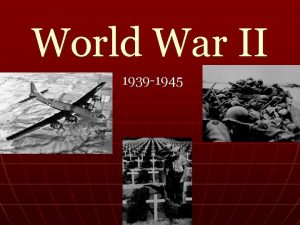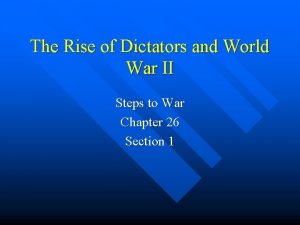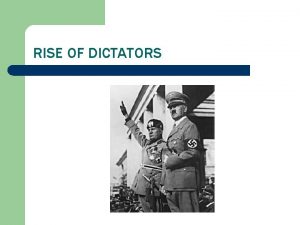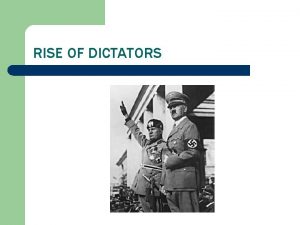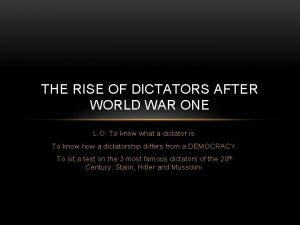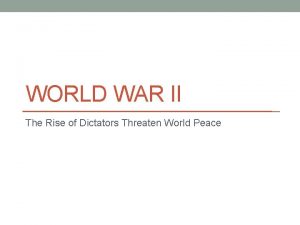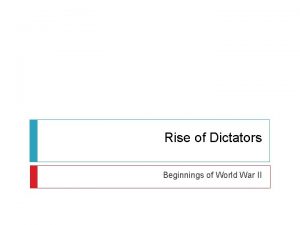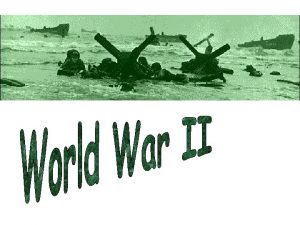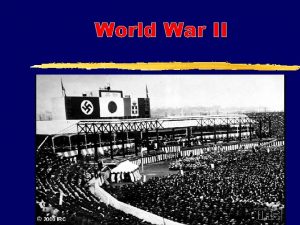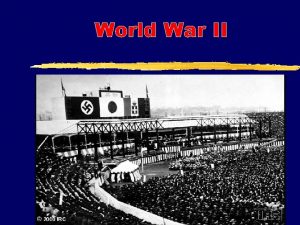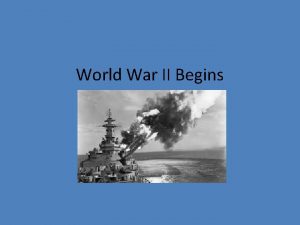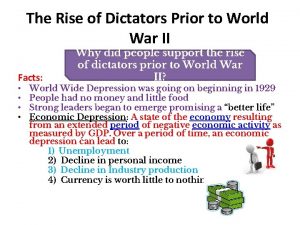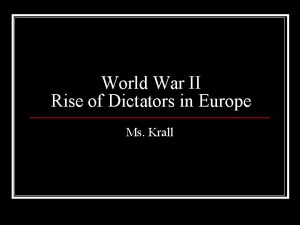The Rise of Dictators Unit 7 World War


























- Slides: 26

The Rise of Dictators Unit 7: World War 2 Part 1

The Rise of Dictators World War 2: Unit 7

WW 2 Vocabulary-Part 1 • • • Fascist Political Party Mussolini Stalin USSR Tojo National Socialist Workers Party Mein Kampf Chancellor of Germany Dictator of Germany

Benito Mussolini • Born July 29, 1883 near Predappio, in northeast Italy. • In 1902 Mussolini moved to Switzerland, where he became involved in socialist politics. • He returned to Italy in 1904, and he worked as a journalist in the socialist press. • He fought for Italy during WW I.

Benito Mussolini • In 1919 Mussolini created the Fascist Political Party. • Fascists believed that order in society and national greatness came through a dictator who led a strong government and built an empire. • Anti-communist

Benito Mussolini

• Mussolini’s army, known as the Black Shirts marched on Rome in October of 1922, and removed King Victor from the royal palace. Mussolini made himself dictator, taking the title ‘Il Duce’ (The Leader). • 1925 Il Duce invaded northern and eastern Africa -he had rebuilt Italy into a war machine, ending unemployment.

Il Duce


Joseph Stalin • Born December 18, 1879 in Georgia, Russia • He devoted his younger years to the revolutionary movement against the Russian monarchy.

Joseph Stalin • Russia fights for Serbia in 1914, becoming part of the allied forces. • 1917 Russian civil war begins; resulting in the establishment of a communist government called the Soviet Union. (1919) • Also known as the Union of Soviet Socialist Republics (USSR) • In 1926, Stalin became the new Soviet dictator.

Joseph Stalin


• Stalin focused on creating a model communist state. • Stalin abolished all privately owned farms and replaced them with collectives (large government-owned farms). • All economic activity was placed under government management.

Joseph Stalin • Stalin arrested/killed political enemies, along with artists and intellectuals. • Between 15 and 20 million people died under Stalin’s rule.

Japanese Militarists • In Japan, difficult economic times helped undermine the political system. • Many Japanese military officers blamed the country’s problems on corrupt politicians. • They believed that Japan was destined to dominate East Asia and that straying from traditional beliefs corrupted the country.

• In September 1931, the Japanese army invaded Manchuria, a resource-rich region of northern China. The military was in command of Japan.

Japanese Militarists • “The Capture of Nanking” – Japanese army swept through China, and in 1937 invaded Nanking, destroying the city and killing as many as 300, 000 residents. – In October 1941, Tojo took over as prime minister.


Japanese Militarists

Adolf Hitler • Born on April 20, 1889 in Austria. • Hitler left school at 16 with no qualifications and struggled to make a living as a painter in Vienna.

Adolf Hitler • In 1913, he moved to Munich and, on the outbreak of World War I, enlisted in the German army, where he was wounded and awarded a medal for his bravery. • In 1919, he joined the fascist German Workers’ Party.

Inupon Germany European were dependent U. S. Thenations Causes of World War I was investment to help rebuild, …butinflation the Great Depression led to a world-wide depression in so bad, that the 1930 s, especially in Europe money became worthless; Here German children use stacks of German money as play toys

Adolf Hitler • By 1921 he became leader of the National Socialist Workers’ Party (Nazi Party). • In 1923, Hitler/Nazi Party attempted an unsuccessful move to overthrow part of the German government. • Hitler went to prison for nine months. It was here that he wrote his book “Mein Kampf” outlining his political ideology.

Adolf Hitler • January 1933, Hitler became Chancellor of Germany. (vice president) • He began to institute anti-Jewish laws and he began the process of German militarization and territorial expansion. • 1934 Hitler becomes Dictator of Germany • (leader)

 Rise of dictators graphic organizer
Rise of dictators graphic organizer Chapter 14 section 2 totalitarianism
Chapter 14 section 2 totalitarianism Types of dictatorship
Types of dictatorship Chapter 16 section 1 dictators threaten world peace
Chapter 16 section 1 dictators threaten world peace World war looms chapter 24
World war looms chapter 24 Chapter 24 section 1 dictators threaten world peace
Chapter 24 section 1 dictators threaten world peace Chapter 16 section 1 dictators threaten world peace
Chapter 16 section 1 dictators threaten world peace Dictators threaten world peace
Dictators threaten world peace Chapter 16 section 1 dictators threaten world peace
Chapter 16 section 1 dictators threaten world peace Rise and rise again until lambs become lions
Rise and rise again until lambs become lions Richard nixon tricky dicky
Richard nixon tricky dicky Rise again and again until lambs
Rise again and again until lambs Rise and rise again until lambs become lions origin
Rise and rise again until lambs become lions origin Roman dictators
Roman dictators Unit 6 review questions
Unit 6 review questions War at home vs war abroad madison
War at home vs war abroad madison Vietnam war
Vietnam war Welcome 1 unit 10 lesson 1
Welcome 1 unit 10 lesson 1 Presidential and congressional reconstruction venn diagram
Presidential and congressional reconstruction venn diagram Was john bradford pro war or anti war
Was john bradford pro war or anti war Ich war, du warst
Ich war, du warst Tug of war or tug-of-war
Tug of war or tug-of-war Why was the civil war the first modern war
Why was the civil war the first modern war Bringen pasado simple
Bringen pasado simple Toward civil war lesson 3 secession and war
Toward civil war lesson 3 secession and war Proxy war cold war definition
Proxy war cold war definition Chapter 30 the war to end war
Chapter 30 the war to end war
